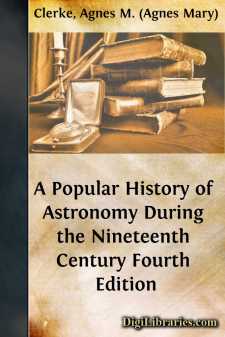Categories
- Antiques & Collectibles 13
- Architecture 36
- Art 48
- Bibles 22
- Biography & Autobiography 813
- Body, Mind & Spirit 142
- Business & Economics 28
- Children's Books 17
- Children's Fiction 14
- Computers 4
- Cooking 94
- Crafts & Hobbies 4
- Drama 346
- Education 46
- Family & Relationships 57
- Fiction 11829
- Games 19
- Gardening 17
- Health & Fitness 34
- History 1377
- House & Home 1
- Humor 147
- Juvenile Fiction 1873
- Juvenile Nonfiction 202
- Language Arts & Disciplines 88
- Law 16
- Literary Collections 686
- Literary Criticism 179
- Mathematics 13
- Medical 41
- Music 40
- Nature 179
- Non-Classifiable 1768
- Performing Arts 7
- Periodicals 1453
- Philosophy 64
- Photography 2
- Poetry 896
- Political Science 203
- Psychology 42
- Reference 154
- Religion 513
- Science 126
- Self-Help 84
- Social Science 81
- Sports & Recreation 34
- Study Aids 3
- Technology & Engineering 59
- Transportation 23
- Travel 463
- True Crime 29
A Popular History of Astronomy During the Nineteenth Century Fourth Edition
Description:
Excerpt
INTRODUCTION
We can distinguish three kinds of astronomy, each with a different origin and history, but all mutually dependent, and composing, in their fundamental unity, one science. First in order of time came the art of observing the returns, and measuring the places, of the heavenly bodies. This was the sole astronomy of the Chinese and Chaldeans; but to it the vigorous Greek mind added a highly complex geometrical plan of their movements, for which Copernicus substituted a more harmonious system, without as yet any idea of a compelling cause. The planets revolved in circles because it was their nature to do so, just as laudanum sets to sleep because it possesses a virtus dormitiva. This first and oldest branch is known as "observational," or "practical astronomy." Its business is to note facts as accurately as possible; and it is essentially unconcerned with schemes for connecting those facts in a manner satisfactory to the reason.
The second kind of astronomy was founded by Newton. Its nature is best indicated by the term "gravitational"; but it is also called "theoretical astronomy." It is based on the idea of cause; and the whole of its elaborate structure is reared according to the dictates of a single law, simple in itself, but the tangled web of whose consequences can be unravelled only by the subtle agency of an elaborate calculus.
The third and last division of celestial science may properly be termed "physical and descriptive astronomy." It seeks to know what the heavenly bodies are in themselves, leaving the How? and
the Wherefore? of their movements to be otherwise answered. Now, such inquiries became possible only through the invention of the telescope, so that Galileo was, in point of fact, their originator. But Herschel first gave them a prominence which the whole progress of science during the nineteenth century served to confirm and render more exclusive. Inquisitions begun with the telescope have been extended and made effective in unhoped-for directions by the aid of the spectroscope and photographic camera; and a large part of our attention in the present volume will be occupied with the brilliant results thus achieved.
The unexpected development of this new physical-celestial science is the leading fact in recent astronomical history. It was out of the regular course of events. In the degree in which it has actually occurred it could certainly not have been foreseen. It was a seizing of the prize by a competitor who had hardly been thought qualified to enter the lists. Orthodox astronomers of the old school looked with a certain contempt upon observers who spent their nights in scrutinising the faces of the moon and planets rather than in timing their transits, or devoted daylight energies, not to reductions and computations, but to counting and measuring spots on the sun. They were regarded as irregular practitioners, to be tolerated perhaps, but certainly not encouraged.
The advance of astronomy in the eighteenth century ran in general an even and logical course....


